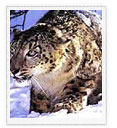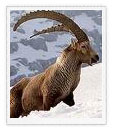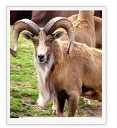

  |
|
| Ladakh TrekkkingToursLadakh TourismMonasteries FestivalsTrekking Adventure & ToursHotels in Ladakh |
     |
Ladakh Trekking Tours :: Wildlife in Ladakh Ladakh WildlifeLadakh is an inexplicable land cloaked in myth and legend. Much of its very old history is known only through the mythology of its people, as its written history is of very recent origin. Known for centuries as the 'land of passes' (La-pass; Dacha-land), Ladakh was discovered by Fa-hian, who traveled across its inhospitable terrain in 399 A.D. , as 'The land where snow never melts and only corn ripens'. Its landscapes are hostile by any measure. Snow-swathed mountains rise to several thousand feet above one of the most elevated plateaus on earth. A treeless wind-swept country, much of Ladakh can be termed as mountainous, Arctic desert, where everything is parched by the rarefied dryness of the atmosphere. Scattered here and there, a few narrow fertile valleys provide a clear sparkling air. The limpidity of the atmosphere, in fact, gives the night sky a unique clarity, so full and bright with stars that one feels transported to some ethereal setting, far removed from Earth. For endless years, before man had even discovered this remote land, several hardy animals and birds lived together here in an exquisite equilibrium. Circumstances have now changed, as they have almost everywhere else on the subcontinent. Today, Ladakh's flora and fauna are threatened and protection is vital if the ancient ecosystems are to survive the trauma of modern man. This mysterious "land of passes" (La-pass, Dakh-land) stands at a height 4,600 meters in the outer Himalayas with its peaks, ranging from 5,800 to 7,600 meters forming the most striking feature of the area. The Himalayas, higher than the mightiest mountains anywhere in the world, are clearly the result of a process of folding-a moment of the coastal plates by which one drifting piece of land overrides another. When two such drifting continental pieces collide and wrap, the resultant wrinkles form mountains. This Himalayan massif is believed to be the result of such a collision between the Indian and Asian plates (geologically a comparatively recent phenomenon). Consequently, much of the high altitude Himalayan fauna is typical of both the oriental and Palearctic regions. Ladakh's most striking feature is nakedness of the country. Lying as it does to the North of the main Himalayan range, most of Ladakh falls in the Palearctic rather than the oriental region. Ladakh possesses virtually no natural forests, though along riverbanks and valleys some greenery does exist. The lower mountain slopes are sparse but higher up, near the snow line, wild rose, willow and herbaceous plants have successfully colonized the slopes. This is the alpine zone. While soil, wind, precipitation and exposure are important determinants in the arrangement of specific life, the temperature differential due to altitude is by far the most important factor. Because of the decrease in the temperature, vegetation becomes more sparse and stunted as one ascends the slopes. In this extremely harsh environment the untrained eye would hardly see any evidence of wildlife at all. Animals, which have adapted to the rigorous conditions however, thrive on the minimal vegetation, poor shelter, rocky terrain and bitter cold. Nevertheless, most creatures, notably the ungulates, do migrate to lower regions in winter while others, like the brown bear and marmots, choose to hibernate. Ironically, at this altitude many animals suffer from "mountain sickness" because of the lack of oxygen! Their bodies however, seem to adopt to this condition, as the number of red blood corpuscles increases along with blood acidity. Most large mammals have a unique devise for protection against the cold-- a highly insulated shaggy coat. They, therefore, have less need for shelter from the elements. This perhaps why more species of goat and sheep live here in open country than anywhere else on earth. Birds in Ladakh: The Ladakh region is home to many rare Himalayan birds including Tibetan snow cocks, griffon vultures, and lammergeyers or bearded vultures, which have a 3 m-long wingspan. Many migratory birds are seen in Ladakh including the graceful Black-necked Crane, which can be seen flying in distinctive V-shaped formation across the clear Himalayan sky. Animals in Ladakh: Some of the animals native to the Ladakh plateau are the Wild Yak, Ibex, Bharal or blue sheep, Nyan or Big-Horned sheep, Kiang or Himalayan wild ass, Chiru or Tibetan Antelope and the elusive Snow Leopard.
|